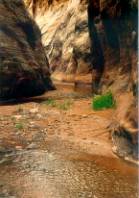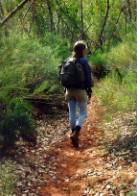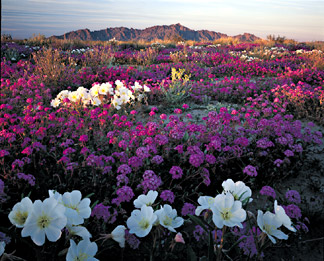
| Issue 2, Spring 2003 | ||||
In Depth: Roads to NowhereWhen most of us hear the word “road,” we typically think of a paved, dotted-line artery running through our neighborhoods and communities. Roads carry us to and from work, school, and play, but they can also bring traffic, trash, and air pollution to our communities and fracture our open space and wildlife habitat.
The loophole, known as Revised Statute 2477 (R.S. 2477) could allow industry and their political allies to argue that long-forgotten or little-used passages are actually “constructed highways” that state and local governments can control.
Across the West, state and local governments are getting ready to file thousands of unsubstantiated claims for federal rights-of-way under the provisions of an 1866 mining law known as RS (Revised Statute) 2477. Repealed by Congress in 1976, this law was originally intended to serve the narrow goal of granting the right to construct and use highways across public lands that were not otherwise reserved or set aside for other public uses (such as to protect water supplies, forests, wildlife, or scenic beauty). The Congressional appeal, however, did not invalidate claims that could be shown to be established and valid prior to 1976. Now it is viewed as a loophole to allow an unmitigated network of roads across some of our most scenic and valued public lands. “If RS2477 is resurrected under a new regulation issued by the Bush administration, thousands of unsubstantiated right-of-way claims threaten to slice up and scar our national parks,wildlife refuges, national forests, and designated wilderness areas with a network of highways,” says Marcia Argust, legislative representative for the Campaign for America’s Wilderness. “Ironically, this anti-wilderness tool can affect private landowners as well.” Former Interior Secretary Bruce Babbitt established a moratorium on any future RS 2477 claims before the close of the Clinton Administration, but the current Secretary, Gale Norton, has recently announced that Babbitt’s claim suspension would be overturned this year. What does this mean for Wilderness in Arizona? Many of today’s phantom-road claims can severely thwart wilderness protection because the presence of a road generally disqualifies an area for wilderness designation. The claims also serve special interests, such as mining, timber, oil and gas industries, and off-road-vehicle users, by providing increased access claims on otherwise protected lands.
“This is a clear example of how the Bush Administration is purposely operating below the media radar screen in a deliberate effort to undermine environmental protections,” says AWC Executive Director Don Hoffman. “In Arizona we have existing and proposed Wilderness that will become exposed to new bogus claims for developing motorized access.”
Most recently, the Bush Administration has issued a new disclaimer rule that could now facilitate road construction by eliminating the 12-year period for filing claims by states and counties, which allows anyone with an “interest” to file under RS 2477. This means that non-governmental entities, such as private companies and industries, can participate in requesting the opening or expansion of claims into actual roads. The potential results are appalling. Already in California, for example, San Bernardino County has received 2,300 miles of claims in the Mojave Preserve alone. Pro-road activists there are busily mapping all new claims, conducting fieldwork, and documenting all routes. Utah is grappling with nearly 20,000 claims statewide. Moffat County in Colorado is aggressively pursuing approximately 3,000 miles of claims on BLM and FWS lands. What’s worse—states may be called on by the Bush Administration to deal with the claims internally, rather than dealing with the federal environmental laws and traditional land management procedures that guide road building and other access issues on public lands. Such circumvention of federal safeguards will allow pro-development state leaders to grab the reins that govern public land protection. “While our nation remains focused on world events the anti-environment agenda quietly marches on,” says Hoffman. “I welcome a national campaign to expose this R.S. 2477 disclaimer rule for what it is – a give away to off-road user groups and other special interests that are opposed to wilderness and roadless protections. All wilderness advocates and conservation minded citizens need to tune-in to this issue.”
For more information about the threat of RS 2477 to your public lands, visit www.highway-robbery.org , the website for a coalition of groups around the country that plans to stop the RS 2477 revival in its ugly tracks. And…Why not write to Arizona Governor Janet Napolitano, asking her to refuse to support road construction on our public lands? Since the Bush Administration wants more state control over public land management, we must ask our governor to manage them with wildlife habitat and ecosystem health in mind! Write: Governor Janet Napolitano, 1700 West Washington St., Phoenix, AZ 85007. Phone: 602-542-4331, or fax: 602-542-1381.
|
||||





 Make your spring and early summer outdoor plans here! Visit our comprehensive
list of day outings, inventory trips, meetings, and upcoming AWC events for
the latest in wilderness “happenings” around the state.
Make your spring and early summer outdoor plans here! Visit our comprehensive
list of day outings, inventory trips, meetings, and upcoming AWC events for
the latest in wilderness “happenings” around the state. 